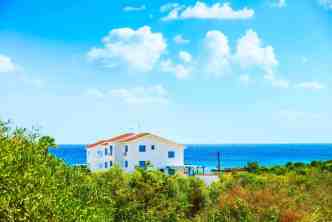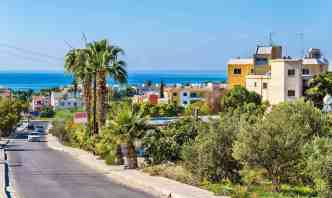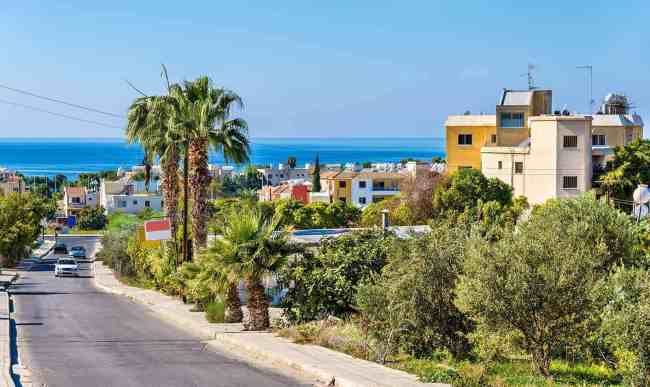Both South and North Cyprus tax their residents using a tiered taxation system. Both sides also offer special conditions to expat retirees. In this guide, you will find out how much tax you may have to pay when you become a tax resident in Cyprus.
In this guide:
- Cyprus tax residency: how to qualify.
- Non-Dom program: what it is and how you can benefit from it.
- Cyprus’ flat tax or tiered system: which one to opt for to pay less tax.
Is Cyprus a tax haven?
Cyprus is known as a low-tax destination with significant tax advantages for expats and businesses, but officially, it is not considered a tax haven.
South Cyprus offers great tax incentives for expat retirees, making them very attractive retirement destinations.
South Cyprus taxation
Cyprus has Double Taxation Treaties (DTT) with over 60 countries worldwide, including the UK, USA, Canada, and all of the EU.
If you are an expat resident living in Cyprus, and your home country has a DTT with Cyprus, you will never be double-taxed on the same income. Instead, you will be taxed on certain incomes in either your country of domicile or your country of residence, depending on the DTT between the two countries.
The DTT between the Republic of Cyprus and your home country makes it extremely attractive for foreign citizens to retire, set up a business, and invest in South Cyprus.
How do I become a tax resident in South Cyprus?
All you need to do to become a tax resident in South Cyprus is to spend 60 days there while not being a tax resident in any other country and not spending more than 183 days in any other country.
South Cyprus Non-Domicile Program
The term “resident but not domiciled”, also called Non-Dom Cyprus, was passed as law in July 2015. Any individual relocating to Cyprus and taking up Cyprus tax residency can generally qualify as a Cyprus non-domiciled resident and stay as such for 17 years of residence in Cyprus.
To be considered non-domiciled in Cyprus, an individual must have a domicile of choice outside of Cyprus and mustn’t have been a Cyprus tax resident in the last 20 years prior to the relevant tax year.
Cyprus non-domiciled tax residents are completely exempt from Special Contribution for Defence (SDC) on dividends, interest, and rental income no matter where they originate from and were paid to.
The total tax exemption makes the holding of investments in dividends and/or interest-earning financial assets, including shares and bonds, in Cyprus and anywhere in the world extremely attractive for non-Cyprus domiciled individuals.
Cyprus non-doms are also exempt from capital gains tax and are eligible for a 50% reduction in land transfer fees on properties acquired before December 31, 2016. They can also enjoy exemption from wealth, gift, or inheritance taxes in Cyprus.
If you have been a tax resident of Cyprus for at least 17 years out of the last 20 years prior to the tax year, you will be considered to be “domiciled in Cyprus”, and your tax position will change.
What is the corporate tax rate in South Cyprus?
The regular corporate tax is 12.5% on profits. There is a 2.5% tax on royalties received in connection with intellectual property rights held in Cyprus.
South Cyprus income tax for expats
Personal income in Cyprus is taxed on a tiered basis, with quite a substantial tax-free allowance of €19,500.
The maximum income tax rate on personal income in Cyprus is presently set at 35% for income in excess of €60,000.
Individuals taking up employment in the Republic who were non-resident prior to employment are entitled to an allowance of 20% remuneration up to a maximum of EUR 8,543 for a period of three years.
Individuals with annual remuneration in excess of EUR 100,000 are entitled to an increased allowance of up to 50% for a period of five years.
Taxes on pensions and passive foreign incomes in South Cyprus
Any foreigner with a passive income outside of Cyprus when moving to Cyprus has two options:
- To pay a fixed tax rate of 5% a year on their income for amounts exceeding €3,420
- Or to opt for Cyprus’ tiered income tax system
In addition, a retired person can switch between Option 1 and Option 2 on a yearly basis.
The advantage of using this switch lies in the amount of money you can have tax-free in Cyprus before your income becomes taxable if you opt for tiered taxation.
At present, Cyprus residents can earn up to €19,500 tax-free.
The next €8,500 (between €19500 and €28,000) is taxed at 20%. Income between €28,000 and €36,300 is taxed at 25%, an income of €36,300 – 60,000 is taxed at 30%, and everything above €60,000 will give you a tax bill of 35%.
So, if you intend to draw a relatively small annual income, it makes sense to opt for a tiered system.
The following table illustrates how it works:
| Income (€) | Tiered tax rates | Flat tax rate of 5% above €3,420 (€) |
| 19,500 | zero tax | €804 |
| 25,000 | €19,500 – tax-free €5,500 @ 20% – €1,100 Total: €1,100 | €1,079 |
| 26,000 | €19,500 – tax-free €6,500 @ 20% – €1,300 Total: €1,300 | €1,179 |
| 30,000 | €19,500 – tax-free €8,500 @ 20% – €1,700 €2,000 @ 25% – €500 Total: €2,200 | €1,329 |
| 40,000 | €19,500 – tax-free €8,500 @ 20% – €1,700 €8,300 @ 25% – €2,075 €3,700 @ 30% – €1,110 Total: €4,885 | €1,829 |
| 65,000 | €19,500 – tax-free €8,500 @ 20% – €1,700 €8,300 @ 25% – €2,075 €23,700 @ 30% – €7,110 €5,000 @ 35% – €1,750 Total: €12,635 | €3,079 |
As you can see, the year your retirement income exceeds €25,000, you will start saving money on tax by switching over to the flat tax rate of 5%. The bigger the income you draw, the more money you save on your tax bill.
After you stay in the Republic of Cyprus for more than 183 days in one year, you will be regarded as a non-domiciled tax resident, and from now on, bank interest and share dividends will become tax-free, too.
You might find useful:
- Living In Cyprus – The Expats’ Guide: a detailed manual to moving to South Cyprus, including residency, cost of living, healthcare, etc.
- Best Places To Live In The Republic Of Cyprus – most popular expat locations in South Cyprus
- The Expat Guide to UK Pensions Abroad – detailed information about your state, workplace, and private pensions when you retire abroad; your options and tax implications
- Didn’t find what you were looking for or need further advice? Comment with your question below, and we will do our best to help.
Helpful external links:
- Information on foreign pension taxation in The Republic of Cyprus – Cyprus Tax Department.















I was wanting to retire to Spain but have discovered I will have to pay tax of 20% on whatever is in my bank account each and every year. I am hoping it isn’t that way in Cyprus, as that is now my desired retirement destination.
Thanks,
Mark.
Hi Mark,
Yes, indeed, Cyprus is tax-friendly, which is great if you’re considering moving there. It’s also important to follow your heart and choose a place you feel good about. It’s worth taking some time to explore and get to know Cyprus before making any commitments.
Good luck with your move wherever you are going
What is the corporate tax rate in the Northern Cyprus? Thank you
HI Ilya, theres 16% vat monthly and 15% annual income tax. I would suggest you contact a local accountant for further info on taxes payable as it will depend on the company you set up etc
hey there,
who can I contact for tax help in north cyprus?
Hi,
As a married British couple planning to retire to south Cyprus will we be liable to pay Cypriot tax on our substantial savings in UK?
Hi Claire,
Thank you for your comment, it looks like you need specific financial advice. I would recommend that you email dean.kirwan@abbeywealth.com from Abbey Wealth, they have advisers who specialise in dealing with expats in Cyprus. Dean can arrange a free review with a qualified Adviser to discuss your situation.
hey Ola,
can I reach this email address for tax help in North Cyprus as well?
Hi Jack, reach out to Kate, our North Cyprus expert https://expatra.com/author/katesmith/, she will be able to recommend somebody.
HI Jill, as there is no agreement and as your salary would be paid into a UK account, you would not be taxed in the TRNC.
Many expats have their pensions paid into a UK bank account and just withdraw it in the TRNC as and when required with no tax implications.
Hope this helps
We may be moving to TRNC where I would continue working remotely for my UK based company, with salary being paid into my UK bank account. I would then fully retire in about 3.5 years. Questions – will I be taxed on my income in only the UK, or would I have to pay tax in both UK & TRNC ? When I retire, would it be best for my state pension to be paid into a TRNC bank account, and are there tax implications?
Good afternoon, we should setup a company in Cyprus . Is it applicable the 50% exemption for expats that were never resident in Cyprus before ? For how many years ? Many thanks
Best Regards
David
Hi David,
This exemption applies to those who bought their property between 16 July 2015 and 31 December 2016 (provided certain conditions are met). If your property was acquired in this period, you will not need to pay CGT on any gain when you sell the property.